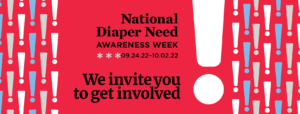More than nine years ago I wrote an op-ed for CNN describing a moment of gestalt that changed my life. During a clinical home visitation with a new mother named Angie, I saw her remove a diaper from her baby, dump out the solid waste, and then put the diaper back on her child’s bottom. When I asked why, she responded simply, “I can’t afford diapers.”
As a social worker, I thought there must be some type of federal program that helps low-wage parents and those living in poverty with things like diapers, I just needed to get Angie registered.
I was wrong.
What I came to understand is that programs like WIC (Women, Infants and Children) and SNAP (Supplemental Nutrition Assistance Program) are food-based, designed to help feed children, and should remain so. No parent should be forced to choose between food for their baby or clean diapers or heat for their home.
Yet here we are, in 2022, in the richest country in the history of the world, and 1 in 3 U.S. families with young children cannot afford the diapers required to keep their babies clean, dry, and healthy. This is known as “diaper need” and it’s a recognized public health issue that negatively impacts the physical, mental, and economic well-being of our friends and neighbors, as well as each of our communities.
It is also at the center of National Diaper Need Awareness Week (September 24 – October 2, 2022), which mobilizes individuals and communities across the country to take action to help end diaper need.

I’m fond of saying small things impact big things. Small things like diapers can change lives. Having an adequate supply of clean diapers improves so many things:
- the health of a child, by reducing the chances of severe diaper rash and diaper dermatitis that can result in increased medical costs and doctors’ visits;
- the ability of a parent to go to work or school, as most day care centers require a daily supply of diapers to care for a baby. Without diapers, parents cannot go to work and lose income and the opportunity to succeed. In fact, parents struggling with diaper need report missing an average of four days of work per month;
- the well-being of a mom, as diaper need is highly correlated to maternal depression, even more so than food insecurity.
The National Diaper Bank Network and our more than 225-member basic needs banks are leading efforts to end diaper need in the U.S. Last year, the Network distributed more than 187.8 million diapers, serving nearly 260k children per month on average. While that’s a lot of diapers, it’s not nearly enough.
Thanks to the support of diaper manufacturers, individual donors, and foundations, NDBN is able to get more diapers to more families than ever before. Recently, NDBN leveraged a $100,000 gift made by the Steven & Alexandra Cohen Foundation this past Mother’s Day, to purchase and distribute nearly 1.7 million diapers to 30 member diaper banks throughout the country. This is huge and it improves the lives of children and families.
Equally important is that our network of advocates is working to end diaper need by raising awareness of the issue and changing public policy. We are working to eliminate state sales tax on diapers which remains in effect in 29 states. And we are pushing forward legislation to end diaper need with our champions in the U.S. Senate and House of Representatives.
As we continue to mark National Diaper Need Awareness Week, I invite everyone to get involved, now or any time of the year.
- Host a diaper drive;
- Volunteer at a local diaper bank;
- Engage in Real Talk on social media via #EndDiaperNeed and #BasicsArentBasic;
- Make a donation to NDBN and/or a member diaper bank in your community.
Thanks to the Steven & Alexandra Cohen Foundation for recognizing that small things do matter. Now, let’s #EndDiaperNeed.
Joanne Samuel Goldblum
CEO, National Diaper Bank Network
Co-author of Broke in America: Seeing, Understanding, and Ending U.S. Poverty
The National Diaper Bank Network (NDBN) is a nationwide nonprofit dedicated to eliminating diaper need in America, by leading a national movement to help meet the basic needs of all babies and their families, including access to clean, dry diapers and other material goods.
